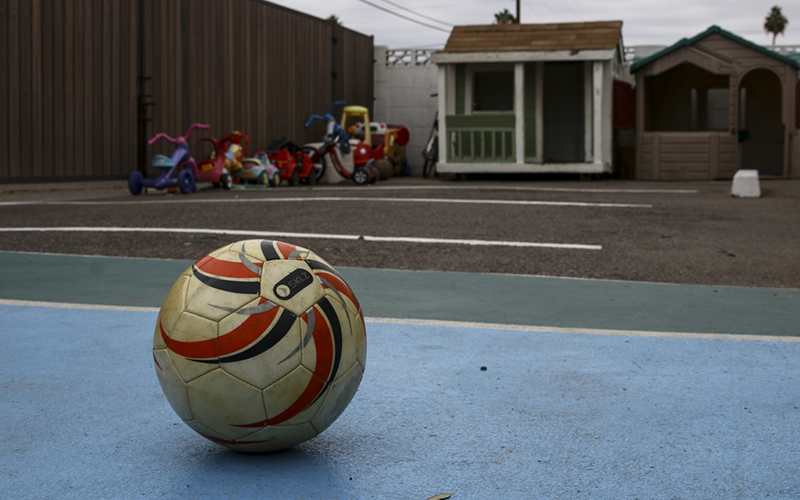
A soccer ball sits in the outside play area of Family Promise of Greater Phoenix, a nonprofit that provides shelter and services to homeless families. (Photo By Danielle Quijada/Cronkite News)
SCOTTSDALE – Roberta Mahoney Alhassasnah was “petrified” when she and her family lost their apartment a few weeks ago and became homeless.
She’d heard about homeless shelters, the unsanitary conditions, the drug users and dealers. She feared that authorities would take her 16-year-old son on grounds she was an unfit parent because she didn’t have a home.
Her husband, a hospital chef, lost his job. And Mahoney Alhassasnah, a former licensed practical nurse, has heart problems and diabetes and can’t work.
But Mahoney Alhassasnah and her family found Family Promise of Greater Phoenix, a 16-year-old nonprofit providing temporary emergency shelter and services for homeless families aiming to be self-sufficient.
A recent Department of Housing and Urban Development report stated that homelessness has fallen nearly 30 percent in Arizona. Since 2010, the report said, Arizona has seen a significant drop in homelessness that exceeds the nationwide decrease during the same time period.
But Ted Taylor, the director of Family Promise of Greater Phoenix, told Cronkite News these numbers don’t account for the families living in Walmart parking lots, where the cops don’t bother them, or with relatives.
Taylor said that in the six years he has worked at Family Promise, the number of families seeking emergency shelter increased about 13 percent a year. The waiting list is growing.
Unemployment is the major cause of homelessness, he said. But lack of affordable housing keeps people homeless. He added that families from every background, including police officers, teachers and professional singers, have walked through the gates of Family Promise.
“It can happen to any one of us,” Taylor said.
Kids suffer most
Family Promise partners with various churches and synagogues across the Valley to provide overnight stay and meals. The homeless families spend their days at the Scottsdale Family Promise complex. The nonprofit tries to help families “get back on their feet and into stable housing and sustainable employment” within the maximum stay of 60 days, he said.
Families must undergo drug tests and background checks. The shelter forbids the use of drugs and alcohol.
Taylor said Family Promise points parents towards job opportunities, connects families with affordable housing, and provides counseling services for families adjusting to homelessness. It also offers counseling services to homeless kids and makes sure they attend school.
“Most families want to get to work and back in their own housing,” Taylor said.
About 84 percent of the people who get services are single mothers who have two to three children under the age of 10, Taylor said. Children are the most affected by homelessness, Taylor said. They make up about 64 percent of the center’s clients, he said.
According to Taylor, homeless kids are almost three times more likely to have mental health issues as compared to non-homeless children.
One third of children will be taken away from their families by authorities, Taylor said, because their parents are viewed as unfit.
‘The moon and the stars’
Mahoney Alhassasnah said being at the shelter means “everything” to her – it means she can keep her son, her family can keep their two dogs and her husband has resources to find employment. The shelter enrolled her son in a Scottsdale high school, and they now have a roof over their heads as they work towards living on their own.
As long as families are willing to follow the shelter’s instructions, she said, shelter staff “will go to the moon and stars for you.”
Family Promise also allows pets to be kept on the complex through a recently added program sponsored by PetSmart in an effort to keep all family members together, including dogs, cats and even turtles.
Mahoney Alhassasnah said this was huge for her son, whose two dogs are like his brothers.
The shelter, she said, allows her and family to stay together and feel like they’re contributing to their own success.
“They make you feel like you’re not a worthless person,” she said.